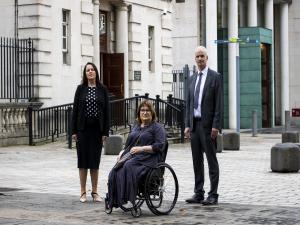
By PA Reporters
A judge has ruled that Stormont’s Executive Office is acting unlawfully in delaying the introduction of a compensation scheme for injured victims of the Northern Ireland Troubles.
The joint legal challenge was brought by Jennifer McNern, who lost both legs in a Troubles bombing in 1972, and Brian Turley, one of the “hooded men” who were arrested and interrogated by the British Army in 1971.
The payment scheme, which should have opened to applications at the end of May, is in limbo due to a dispute between Sinn Fein and the Government over eligibility criteria that are set to exclude anyone convicted of inflicting serious harm during the Troubles.
Sinn Fein claims the scheme would be discriminatory and would potentially exclude thousands of people from the republican community.
In a separate row, the Stormont administration and the UK Government have been at odds over who should pay for the scheme.
In a scathing judgment delivered in Belfast High Court, Justice McAlinden said the Executive Office (TEO) was under a “clear, unqualified and unconditional obligation” to designate a Stormont department to take forward the scheme by establishing a victims payment board by May 29.
The judge said any argument to the contrary was “obtuse, absurd and irrational”.
He dismissed as “nonsense” a TEO contention that the court should not involve itself in what it claimed was a political dispute.
The judge said TEO was deliberately stymieing the introduction of the scheme in a bid to pressure Northern Ireland Secretary Brandon Lewis to change the terms of the scheme.
He said TEO’s stance was “truly shocking” and demonstrated a “wilful disregard” for, or “abject ignorance” of, the rule of law.
Justice McAlinden said Deputy First Minister Michelle O’Neill was the only minister in TEO taking this stance, and highlighted how First Minister Arlene Foster, having initially adopted the same position, had now made clear she was willing to designate a department immediately.
Justice McAlinden gave TEO seven days to respond to the judgment.
Reacting to the judgment, Mr Turley said: “How do the Executive explain the profound unprofessionalism of their approach to victims?
“As a survivor of torture, I was left with long-term injuries as a result of the actions of the state.
“The delay in having to wait on my right to a pension can only be described as another form of torture.”
Responding to the judgment, Ms O’Neill said the UK Government had “acted in bad faith” by not implementing commitments on legacy mechanisms in Northern Ireland.

Michelle O'Neill
Ms O'Neill has said she will nominate a Stormont department to progress a compensation scheme for injured victims of the Northern Ireland Troubles after a High Court judge ruled that an ongoing delay was unlawful.
She called for the convening of an Irish and UK Government summit to progress all outstanding legacy matters.
“The pension scheme ruled on today in the courts was not an Executive scheme. It was legislated for at Westminster and the regulations and guidance have the NIO’s fingerprints all over them. However, the Executive is being forced to implement it,” she said.
“It is not the type of scheme envisaged under the Stormont House Agreement and is completely inconsistent with the legal and agreed definition of a victim.
“It remains a matter of huge concern that this Westminster scheme was designed without input or consultation from Executive ministers or indeed parties in the Assembly. This represents yet another manifestation of British bad faith in Ireland.”
Ms O’Neill said: “I remain convinced that this scheme will be exclusionary, discriminatory and divisive. Its policy intent was and remains to create a hierarchy of victims, and reinforce the British state narrative around the conflict.
“As joint Head of Government I remain committed to delivering a scheme which is based on equality and open to everyone who was seriously physically and psychologically injured during the conflict.
“In light of the court ruling, therefore, I am left with no alternative other than to designate a department.
“However, that designation will require the Executive to work together to secure the additional funds from Westminster for the cost of the scheme and get further clarity on eligibility and applications.”
The DUP Leader and First Minister tweeted her reaction to the judgement:
This is a welcome judgement. Now time for Sinn Fein to prioritise innocent victims rather than bombers. https://t.co/BhcDPB194Z
— Arlene Foster DBE PC #ProudofNI. (@ArleneFosterUK) August 21, 2020
The Justice Minister Naomi Long has previously said she was happy for the Department of Justice to take on the administration of the scheme. She also tweeted her reaction:
I hope today's judgement will allow progress to be made on the Victim's Pension.
— Naomi Long MLA (@naomi_long) August 21, 2020
However, we must be under no illusions: lack of political consensus on the scheme and particularly on who funds it remain significant, unresolved challenges that must be overcome for victims' sakes.
Reacting to the judgment, Brian Turley, who helped bring the case, said: “How do the Executive explain the profound unprofessionalism of their approach to victims?
“As a survivor of torture, I was left with long-term injuries as a result of the actions of the state.
“The delay in having to wait on my right to a pension can only be described as another form of torture.”


 Teenage girl killed in road crash named as Kamile Vaicikonyte
Teenage girl killed in road crash named as Kamile Vaicikonyte
 Covid-19 inquiry ‘an opportunity for candour’ from Stormont leaders
Covid-19 inquiry ‘an opportunity for candour’ from Stormont leaders
 UK and Irish ministers to meet amid row over migration
UK and Irish ministers to meet amid row over migration
 Three men set to go on trial for murder of journalist Lyra McKee
Three men set to go on trial for murder of journalist Lyra McKee
 Swann refuses to rule out resigning if budget is not changed
Swann refuses to rule out resigning if budget is not changed